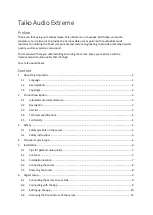
Mini Ankara Twin 4P-Ankara Twin 4P-Mini Arka Twin 4P-Arka Twin 4P
English
05060180 00 03-04-2019
28
19. Defrosting and water drainage
The cabinets described in this manual feature an electric defrost system.
DO NOT
use devices to accelerate thawing
19.1
Draining the water
Install a floor drain with a slight slope to avoid:
-
unpleasant odours inside the cabinet
-
dispersion of cooled air
-
malfunction of the cabinet due to moisture
Procedure
-
install a suitable siphon between the drain and the connection to ground
-
hermetically seal the area of drainage to ground.
i
periodically check that hydraulic connections are perfectly efficient, contacting a qualified
installer.
20. Demisting and anti-condensation
Fogging and condensation are eliminated by the heaters fitted in the cabinet.
21. Lighting
On request, the cabinets can be fitted with neon or LED lighting (Fig. 17) are active.
The light switch is near the electronic controller (Fig. 10) are active.
ATTENTION
! Accidental breakage of bulbs. Injury. Contamination of the goods.
-
wear the envisioned PPE
-
cut off power supply to the cabinet
-
remove all goods
-
clean the cabinet as indicated in chapter 25.4
-
remove any trace of glass from the goods
-
reload the cabinet with goods cleaned thoroughly
-
restore electrical power supply
Replace any faulty or worn lamps with identical ones.
22. Close the sliding windows
Mini Arka Twin 4P and Arka Twin 4P feature longitudinal and transverse sliding closures (PUSH)
Benefits
•
significant reduction in energy used for refrigeration
•
improved temperature of food
•
increased quality of preservation
If opening and
closure prove
difficult
Remedy
•
check the causes of the malfunction
•
use the handle to slide the glass on PVC tracks
What to
avoid
• DO NOT
use excessive force
• DO NOT
carry out different manoueuvres with the closure and
movement system
• DO NOT
drag or slide the locks in other ways; risk of damaging
the locks and injury
• DO NOT
use the sliding locks to support the products during
loading; the closures have not been designed to sustain loads
(Fig. 14)
















































